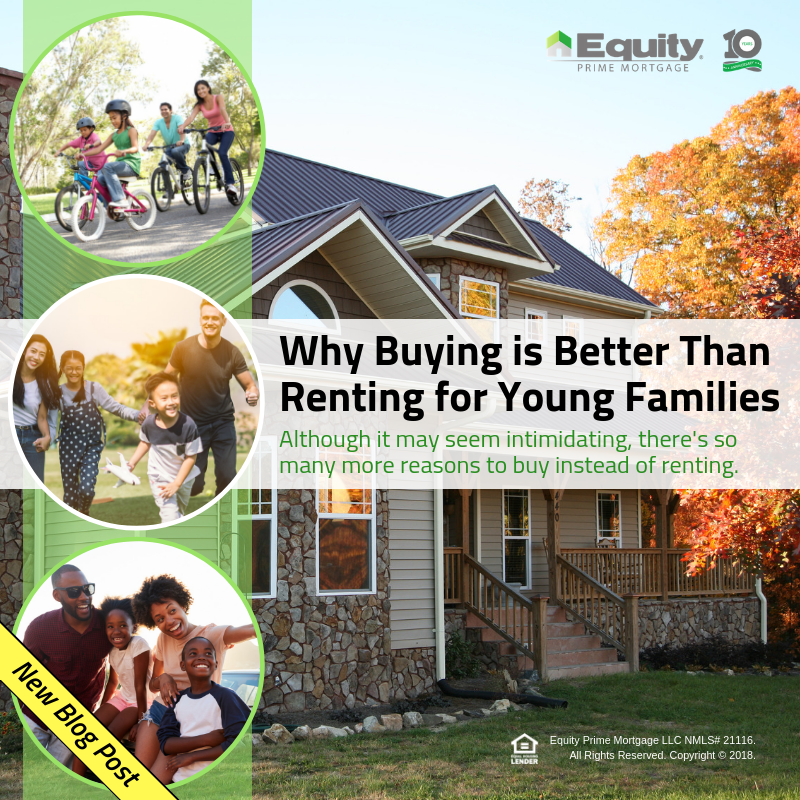Why Buying is Better Than Renting for Young Families

Posted by Eric Skates on
Purchasing a home can be a daunting experience for anyone, but this is especially true for young families. Parents under the age of thirty with one or more children are often less financially stable than their older counterparts, and saving for a down payment can seem impossible.
Yet making the plunge and purchasing a home has significant benefits for young families when compared to renting. While it may be difficult, it is not impossible...and it is definitely worth the effort. Continue reading below to learn all the benefits of homeownership.
Break The Renting Cycle
The renting cycle is a hard one to break, so the sooner you can accomplish this the better. The reason many millennials find themselves unable to break this cycle is a combination of things. Primarily it can be attributed to the amount of money paid out in rent each month. A two-bedroom apartment alone can range anywhere from $800 to $1,800 a month.
Consider this: At the lowest end of the spectrum, young families are paying $10,400 annually on rent. At the highest end of the spectrum, they could be paying out an incredible $21,600! Imagine if that money was actually going towards owning your home instead of "borrowing" it?
Build A Stable Home For Your Children
Young families who rent are typically under one to two-year lease agreements, which are very temporary in the grand scheme of things. These same families often move three or more times while their children are growing up.
Instead of consistently uprooting your family from one place to the next, owning your home could help to provide a stable, secure place for them to grow up. They can have the same friends, attend the same school, and learn their neighborhoods without interruption.
Become Debt-Free Earlier
Purchasing your home is more difficult when you're under thirty, but it also allows you to become debt-free earlier than those who purchase homes in their thirties or forties. If you purchase a home with a thirty-year mortgage at the age of 25, you will pay off your home at 55. If you opt for a fifteen-year mortgage instead, you could pay your home off by the age of 40.
This can be especially helpful during retirement when finances become tighter. While it may seem like a long way off right now, the post-working years come sooner than you think.
Create Collateral
Everyone likes to think that "it would never happen to them," but the truth is that emergencies happen. If an emergency requiring a different kind of loan were to occur, owning a home can be an essential form of collateral. As your pay off your mortgage, you're building equity in your home and can borrow against that equity. If a medical emergency or something similar were to occur, however, it does offer one option.
Your Home, Your Rules
One issue with renting is that you are forced to live by the rules of whomever you rent from. Often, this means that you are not allowed to make any alterations to the property - including things as simple as painting the nursery or children's room.
When you own a home you live by your own set of rules. Outside of building projects, which require approval from your county's local government, you can do as you wish. You can paint the walls, redo the floors, install a reading nook, or make use of more energy-efficient technologies as you please.
Expanding the Family with Pets
Pets like dogs or cats can be a child's best friend, and they also serve several practical purposes - like teaching responsibility. Unfortunately, pets are often not allowed inside rentals because landlords believe they cause significant property damage.
When you own your home, however, you can not only adopt pets for your family but provide them with a reliable, safe home for the rest of their years.
There are many reasons for a young family to purchase a home. Although it can be difficult at first, the hardships of purchasing a home while young are well worth it.
If you're ready to get started with your first home purchase, contact us today (877) 255-3554 (Toll Free) or fill out a pre-qualification application.



